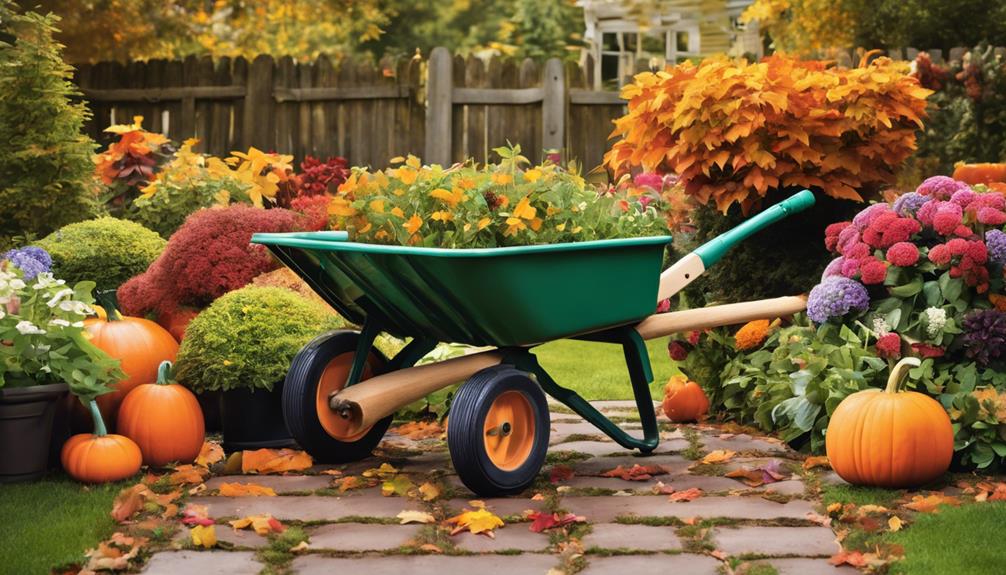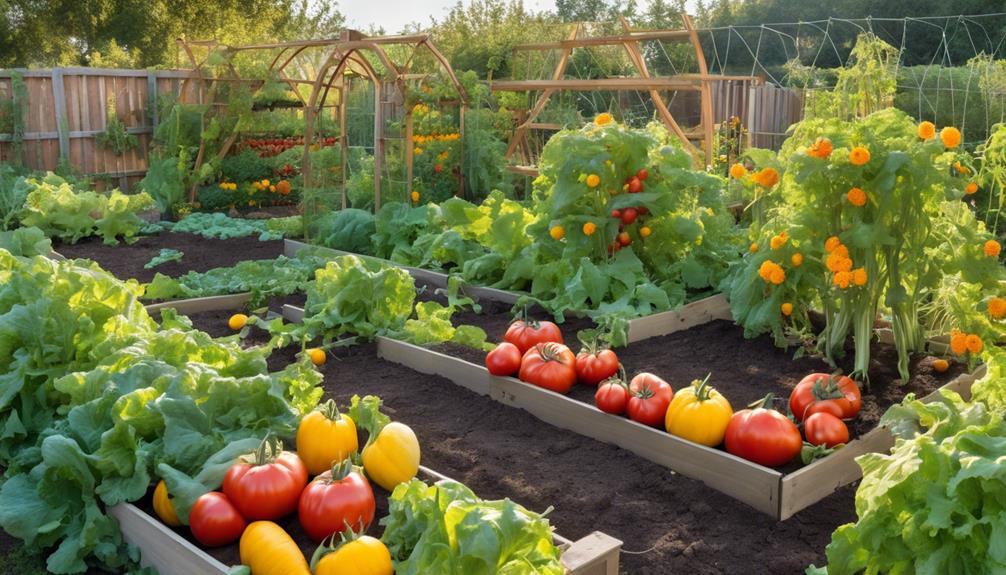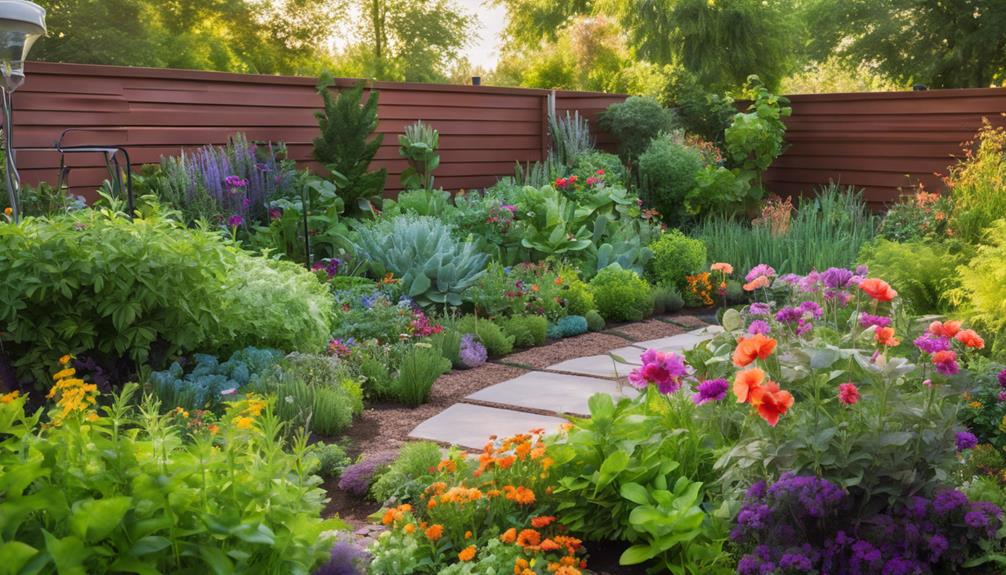What Are Hardscaping Services for Commercial Properties?
19 March 2025Top Tips for Seasonal Hedge Trimming Success
19 March 2025To ensure a flourishing garden, homeowners should concentrate on three essential maintenance tips.
Firstly, regularly test and amend the soil to optimise pH and nutrient levels, thereby promoting healthy plant growth.
Secondly, implement a strategic seasonal planting schedule; select plants based on local climate conditions to maximise yield.
Finally, practise consistent watering and mulching techniques to retain moisture and suppress weeds.
These measures will enhance overall plant health and resilience.
For further insights on seasonal care and specific techniques, exploring additional resources could provide valuable guidance to elevate your gardening experience.
Seasonal Garden Care Essentials
To achieve a thriving garden, proper soil preparation and adherence to a seasonal planting schedule are critical.
Understanding the soil's composition and amending it accordingly can greatly improve plant growth.
Furthermore, timing your planting with the seasons ensures that your garden reaches its full potential throughout the year.
Soil Preparation Techniques
How can effective soil preparation set the foundation for a thriving garden?
Mastering soil preparation is pivotal to successful gardening, as it improves nutrient availability and enhances drainage.
Begin by testing the soil pH and nutrient levels; this informs necessary amendments. Incorporate organic matter, such as compost or well-rotted manure, to enrich the soil structure and foster beneficial microbial activity.
Aerate compacted soil to promote root growth and water infiltration, employing tools like a garden fork or aerator.
Furthermore, consider tilling the soil to a depth of at least 30 centimetres, ensuring an even distribution of nutrients.
Lastly, allow the soil to rest before planting, enabling microbial processes to stabilise, thereby creating an ideal environment for your future plants.
Seasonal Planting Schedule
A well-structured seasonal planting schedule is essential for maximising the productivity and health of your garden.
Begin by evaluating your local climate and selecting plants that thrive during specific seasons. For spring, consider sowing cool-season crops like lettuce and peas, while summer is ideal for heat-loving varieties such as tomatoes and peppers.
In autumn, focus on planting perennials and preparing for winter by incorporating cover crops to enrich the soil. During winter, prioritise planning for the upcoming growing season, including crop rotation and seed selection.
Regularly monitor your garden's microclimate and adjust your schedule accordingly to ensure ideal growth conditions. By adhering to a meticulous planting schedule, you will cultivate a vibrant, flourishing garden throughout the year.
Soil Quality and Fertility
Soil quality and fertility are essential for a thriving garden, and enhancing these factors can greatly improve plant health and yield.
Incorporating organic matter, practising crop rotation, and utilising mulching techniques are effective strategies for maintaining nutrient-rich soil and promoting moisture retention.
Organic Matter Incorporation
Incorporating organic matter into your garden is vital for enhancing soil quality and fertility.
Organic matter improves soil structure, increases moisture retention, and fosters a diverse ecosystem of beneficial microorganisms.
To effectively incorporate organic matter, consider the following practices:
- Composting: Utilise kitchen scraps and garden waste to create nutrient-rich compost, enriching the soil with important nutrients and improving its texture.
- Mulching: Apply organic mulches, such as wood chips or straw, to suppress weeds, retain moisture, and gradually decompose, adding nutrients back into the soil.
- Cover Crops: Plant cover crops during the off-season to prevent erosion, improve soil structure, and add organic matter when turned into the soil.
Crop Rotation Benefits
Implementing effective gardening practices, such as incorporating organic matter, lays the foundation for improved soil health.
One of the most beneficial techniques is crop rotation, which enhances soil quality and fertility through several mechanisms.
- Nutrient Management: Different crops utilise diverse nutrients; rotating them prevents nutrient depletion and encourages a balanced soil profile.
- Pest and Disease Control: Alternating crops disrupts pest life cycles and reduces disease incidence, minimising reliance on chemical interventions.
- Soil Structure Improvement: Varied root structures from different plant families help aerate the soil and improve moisture retention, fostering a healthier ecosystem.
Mulching for Moisture Retention
While many gardening practices contribute to soil quality and fertility, mulching stands out as a particularly effective method for moisture retention. By applying an appropriate layer of organic or inorganic material to the soil surface, gardeners can considerably improve water conservation and enhance soil health.
The benefits of mulching are multifaceted and include:
- Reduced Evaporation: A mulch layer minimises water loss from the soil, ensuring that plants receive consistent moisture.
- Temperature Regulation: Mulch helps maintain a stable soil temperature, which is crucial for root health and nutrient absorption.
- Weed Suppression: By inhibiting weed growth, mulch reduces competition for water and nutrients, allowing plants to thrive.
Incorporating mulching into your gardening routine is important for optimal soil quality and moisture management.
Practical Steps for Success
To achieve a thriving garden, it is crucial to implement practical steps that enhance plant health and productivity.
This includes conducting soil testing and preparation, applying regular pruning techniques, and utilising effective companion planting strategies.
Soil Testing and Preparation
A thorough understanding of your soil's composition is crucial for successful gardening. Soil testing allows homeowners to identify nutrient deficiencies and pH imbalances, creating a foundation for robust plant health.
To ensure ideal soil preparation, follow these practical steps:
- Conduct a Soil Test: Utilise a home testing kit or send samples to a local extension service to analyse nutrient levels and pH.
- Amend as Necessary: Based on test results, incorporate organic matter, fertilisers, or lime to adjust nutrient levels and improve soil structure.
- Tillage and Aeration: Loosen compacted soil through tilling or aeration, promoting root penetration and enhancing water retention.
Regular Pruning Techniques
Regular pruning is vital for maintaining the health and aesthetics of your garden.
Employing proper techniques not only encourages growth but also helps to prevent diseases. Here are three key pruning strategies to master:
1. Timing: Prune during the dormant season for most trees and shrubs to minimise stress.
However, flowering plants may require specific timing based on their blooming cycles.
2. Technique: Use clean, sharp tools to make precise cuts.
Avoid tearing bark; instead, make cuts at a 45-degree angle to promote quicker healing.
3. Assessment: Regularly evaluate your plants for dead, damaged, or overcrowded branches.
Pruning these improves air circulation and light penetration, fostering a healthier growth environment.
Companion Planting Strategies
While many gardeners focus on individual plant growth, understanding the principles of companion planting can significantly enhance the overall health and productivity of your garden.
This technique involves strategically pairing plants to improve growth, deter pests, and optimise space utilisation.
Implement the following strategies for the best results:
- Mutual Benefits: Choose plants that complement each other, such as tomatoes and basil, which can enhance flavour and repel pests.
- Pest Management: Incorporate flowers like marigolds to attract beneficial insects that prey on harmful pests.
- Nutrient Sharing: Utilise deep-rooted plants (e.g., carrots) alongside shallow-rooted ones (e.g., lettuce) to maximise soil nutrients and moisture levels.
Increased Plant Health and Longevity
Maintaining robust plant health and extending longevity in your garden requires a strategic approach that encompasses a variety of vital practices. Implementing proper watering techniques, utilising organic fertilisers, and practising seasonal pruning are fundamental for cultivating resilient flora. Each of these methods contributes significantly to a plant's ability to thrive and withstand environmental stresses.
| Practice | Benefits | Frequency |
|---|---|---|
| Proper Watering | Prevents root rot; encourages growth | Weekly |
| Organic Fertilisers | Improves soil health; enriches nutrients | Monthly |
| Seasonal Pruning | Improves air circulation; promotes new growth | Biannually |
| Mulching | Retains moisture; suppresses weeds | Annually |
| Soil Testing | Guarantees ideal pH; identifies nutrient deficiencies | Annually |
Pest Control Techniques
Effective pest control is crucial for maintaining a healthy garden ecosystem.
Utilising neem oil, releasing beneficial insects, and incorporating beneficial nematodes can greatly improve plant health while minimising harmful pest populations.
These techniques not only protect your plants but also promote long-term soil vitality.
Neem Oil for Pest Control
Harness the power of neem oil as a natural solution for pest control in your garden. Extracted from the seeds of the neem tree, this organic pesticide is renowned for its efficacy against a variety of pests while being safe for beneficial insects when used correctly.
To utilise neem oil effectively, consider the following techniques:
- Dilution: Mix neem oil with water and a mild soap to create an effective spray, ensuring proper dispersion on plant surfaces.
- Timing: Apply during the cooler parts of the day to minimise leaf burn and improve absorption.
- Frequency: Reapply every 7-14 days or after heavy rainfall to maintain its protective effects.
Beneficial Insect Release
Introducing beneficial insects into your garden can significantly enhance pest control efforts while fostering a healthy ecosystem.
These insects serve as natural predators to various garden pests, thereby reducing the necessity for chemical interventions.
To effectively utilise beneficial insects, consider the following strategies:
- Selection: Choose insects that target specific pests in your garden, such as ladybirds for aphids or lacewings for thrips.
- Release Timing: Introduce these insects during the early stages of pest presence to optimise their effectiveness and establish a balance in the ecosystem.
- Habitat Improvement: Create a conducive environment by planting nectar-rich flowers and maintaining varied vegetation, which will attract and retain beneficial insects.
Beneficial Nematodes for Soil Health
Beneficial nematodes are microscopic roundworms that play an essential role in maintaining soil health and managing pest populations.
These organisms serve as effective biological control agents, targeting a variety of soil-dwelling pests while enhancing soil structure and nutrient cycling.
To optimise their benefits, homeowners should consider the following strategies:
- Application Timing: Introduce beneficial nematodes during moist conditions, ideally in the evening or on overcast days to prevent desiccation.
- Soil Preparation: Ensure the soil is well-aerated and free of chemical residues, which may hinder nematode activity.
- Monitoring: Regularly assess pest populations and soil health to determine the effectiveness of nematode applications and adjust strategies accordingly.
Incorporating these practices will significantly contribute to a thriving garden ecosystem.
Pest Infestations and Remedies
Effective management of pest infestations begins with the identification and removal of weeds that can harbour unwanted pests.
Moreover, fostering beneficial soil microbes strengthens plant health, making them less susceptible to infestations.
Employing organic pest deterrent methods further supports a sustainable approach to maintaining a healthy garden ecosystem.
Identify and Remove Weeds
Weeds can swiftly overtake a garden, competing with your plants for essential nutrients, sunlight, and water. Effective weed management is fundamental for maintaining optimal garden health.
To identify and remove weeds efficiently, follow these steps:
- Regular Inspection: Conduct routine checks in your garden to identify emerging weeds early, ideally before they set seed.
- Proper Identification: Familiarise yourself with common weeds in your region to differentiate them from desirable plants, ensuring accurate removal.
- Manual Removal or Mulching: Utilise hand-pulling for small infestations and apply mulch to suppress future growth, creating an unfavourable environment for weeds.
Fostering Beneficial Soil Microbes
In the realm of garden health, fostering beneficial soil microbes plays a pivotal role in creating a thriving ecosystem.
These microorganisms not only enhance nutrient availability but also contribute to soil structure and suppress harmful pests.
To cultivate an ideal environment for these crucial allies, consider the following strategies:
- Inclusion of Organic Matter: Incorporate compost or well-rotted manure to enrich the soil, providing a diverse food source for microbes.
- Minimise Soil Disturbance: Reduce tillage to maintain soil structure and protect microbial habitats, allowing populations to flourish.
- Diverse Planting: Implement crop rotation and polyculture practices to encourage a variety of microbial communities, promoting resilience against pests and diseases.
Emphasising these practices empowers gardeners to harness the natural benefits of soil microbes effectively.
Organic Pest Deterrent Methods
A healthy garden can quickly become a battleground when pest infestations arise, threatening the well-being of plants and the entire ecosystem.
Employing organic pest deterrent methods not only safeguards your plants but also maintains ecological balance. Here are three effective strategies:
- Companion Planting: Utilise plants that naturally repel pests, such as marigolds to deter nematodes or basil to ward off aphids.
- Natural Insecticides: Employ neem oil or diatomaceous earth, which disrupt pest life cycles without harming beneficial insects.
- Homemade Solutions: Create sprays using garlic, chilli, or soap to repel unwanted invaders while being safe for plants.
Implementing these methods can empower gardeners to combat pests effectively while promoting a sustainable gardening practice.
Why Choose TKL Birmingham Gardener
When considering garden maintenance, choosing TKL Birmingham Gardener can set your outdoor space apart from the rest. With a commitment to excellence, TKL employs skilled professionals who understand the nuances of seasonal gardening.
Their expertise encompasses tailored maintenance strategies that cater to the unique needs of your garden, ensuring optimal growth and aesthetic appeal throughout the year.
Utilising environmentally friendly practices, TKL Birmingham Gardener prioritises sustainability while delivering quality results.
Their attention to detail and personalised service foster a collaborative approach, empowering homeowners to achieve their gardening aspirations.
By selecting TKL, you benefit from a trusted partner dedicated to elevating your landscape, transforming it into a thriving sanctuary that reflects your vision.
Experience the difference with TKL—where mastery meets passion in garden care.
Common Gardening Questions Answered
Gardening enthusiasts often find themselves exploring a myriad of questions as they cultivate their outdoor spaces. One common inquiry pertains to soil health; understanding the pH and nutrient composition is crucial for promoting ideal plant growth.
Furthermore, many gardeners seek clarification on pest control methods. Integrated Pest Management (IPM) offers a sustainable approach by combining biological, cultural, and mechanical tactics to minimise damage.
Another frequent query revolves around the right watering techniques; deep, infrequent watering encourages root development, while overwatering can lead to root rot.
Seasonal Planting Calendar Adjustments
How can gardeners ensure peak plant growth throughout the year? One vital strategy involves adjusting the seasonal planting calendar to local climate conditions and plant requirements. Precision in timing can considerably enhance growth and yield.
Consider these key adjustments:
- Frost Dates: Track the initial and final frost dates specific to your region to avoid planting too early or too late.
- Soil Temperature: Monitor soil temperatures to guarantee ideal germination and root development for different crops.
- Crop Rotation: Adjust planting schedules based on previous crop yields to maintain soil health and prevent pest build-up.




